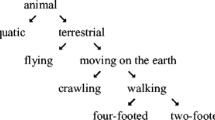Abstract
Each person is perceived by others and by herself as an individual in a very strong sense, namely as a unique individual. Moreover, this supposed uniqueness is commonly thought of as linked with another character that we tend to attribute to persons (as opposed to stones or chairs and even non-human animals): a kind of depth, hidden to sensory perception, yet in some measure accessible to other means of knowledge. I propose a theory of strong or essential individuality. This theory is introduced by way of a critical discussion of Van Inwagen’s and Baker’s ontologies of persons. Composition Theory and Constitution Theory are shown to be complementary, in their opposite strong and weak points. I argue that both theories have unsatisfactory consequences concerning personal identity, a problem which the proposed theory seems to solve more faithfully both to folk intuitions and the phenomenology of personal life.
Similar content being viewed by others
Notes
Thanks to Peter Van Inwagen, who quoted this beautiful verse on occasion of a nice discussion, and even provided the reference!
A first version of this paper was presented in Geneva on occasion of the concluding Philosophical Workshop of the DEA “La personne: Philosophie, Epistémologie, Ethique,” June 2004. I wish to express my gratitude to P. V. Inwagen and L. Baker, who were present as invited speakers, for their illuminating remarks.
Leibniz (1988), p.165. : “What is not really one being is not even really a being ,” Leibniz’ emphasis.
Hering (1921). The idea of individual essences was in fact circulating among phenomenologists of the first generation, in particular those among them who worked at the foundations of a personology—and of the regional ontology appropriated to it. We find relevant insights on the ontology, as well as on the epistemology of essential individuality in Max Scheler’s and Edith Stein’s works. See De Monticelli (2000)
In so far as nineteenth century continental philosophy depends on Kant, it is no exception to the dominance of the DMI. Singularity is not thought otherwise as through an epistemological criterion of a Kantian kind (the “multiplicity of empirical intuition”). This is particularly evident in Hegel’s Phenomenolologie des Geistes, see the Section Bewusstsein, the dialectics of Sensible Certainty.
Hering (1921). The idea of individual essences was in fact circulating among phenomenologists of the first generation, in particular those among them who worked at the foundations of a personology—and of the regional ontology appropriated to it. We find relevant insights on the ontology, as well as on the epistemology of essential individuality in Max Scheler’s and Edith Stein’s works. See De Monticelli (2000)
References
Baker, L. (2000). Persons and bodies: A constitution view. Cambridge: Cambridge University Press.
Berkeley, G. (1948). Three Dialogues between Hylas and Philonous. In A. Luce & T. E. Jessop (Eds), The works of George Berkeley. London: Nelson.
De Monticelli, R. (1998). La conoscenza personale. Introduzione alla fenomenologia, Guerini e associati, Milano.
De Monticelli, R. (2000). Individuality and mind. In Proceedings of the International Conference, The Emergence of the Mind. Milano: Fondazione Carlo Erba.
De Monticelli, R. (2004). Leibniz on Essental Individuality. In G. Tomasi, (Ed.), Proceedings of International Symposium on Leibniz, Studia Leibnitiana
Goodman, N. (1977). The structure of appearance. Dordrecht: Reidel
Gracia, J. J. (1983). Individual as instances. «The review of metaphysics». Sept., XXXVII, 1, 145.
Gracia, J. J. (1988). Individuality: An essay on the foundations of metaphysics. Albany, N.Y.: State University of N.Y. Press.
Hering, J. (1921). Bemerkungen über das Wesen, die Wesenheit und die Idee. In Jahrbuch für philosophie und phaenomenologische Forschung. IV, Halle.
Hume, D. (1958). A treatise of human nature. In L. A. Selby-Bigge (Ed.), London: Oxford University Press.
Leibniz, G. W. (1988). Discours de métaphysique et correspondence avec Arnauld. 30/4/1687, Paris: Vrin.
Leibniz, G. W. (1990). Nouveaux essais sur l’entendement humain. éd. par J. Brunschwig. Paris: Flammarion.
Locke, J. (1975). An essay concerning human understanding. P. H. Nidditch (Ed.), Oxford: Clarendon.
Strawson, P. F. (1963). Individuals. An essay in descriptive metaphysics. Garden City, N.J.: Anchor.
Van Inwagen, P. (1980). Philosophers and the words «human body». In P. van Inwagen (Ed.), Time and cause: Essays presented to Richard Taylor. Dordrecht: Reidel.
Van Inwagen, P. (1995). Material beings. Ithaca N.Y. [etc.]: Cornell University Press.
Van Inwagen, P. (2001). Materialism and the psychological continuity account of personal identity. In Ontology, Identity and Modality. Cambridge: Cambridge University Press.
Author information
Authors and Affiliations
Corresponding author
Rights and permissions
About this article
Cite this article
De Monticelli, R. Subjectivity and essential individuality: A dialogue with Peter Van Inwagen and Lynne Baker. Phenom Cogn Sci 7, 225–242 (2008). https://doi.org/10.1007/s11097-007-9047-1
Published:
Issue Date:
DOI: https://doi.org/10.1007/s11097-007-9047-1




